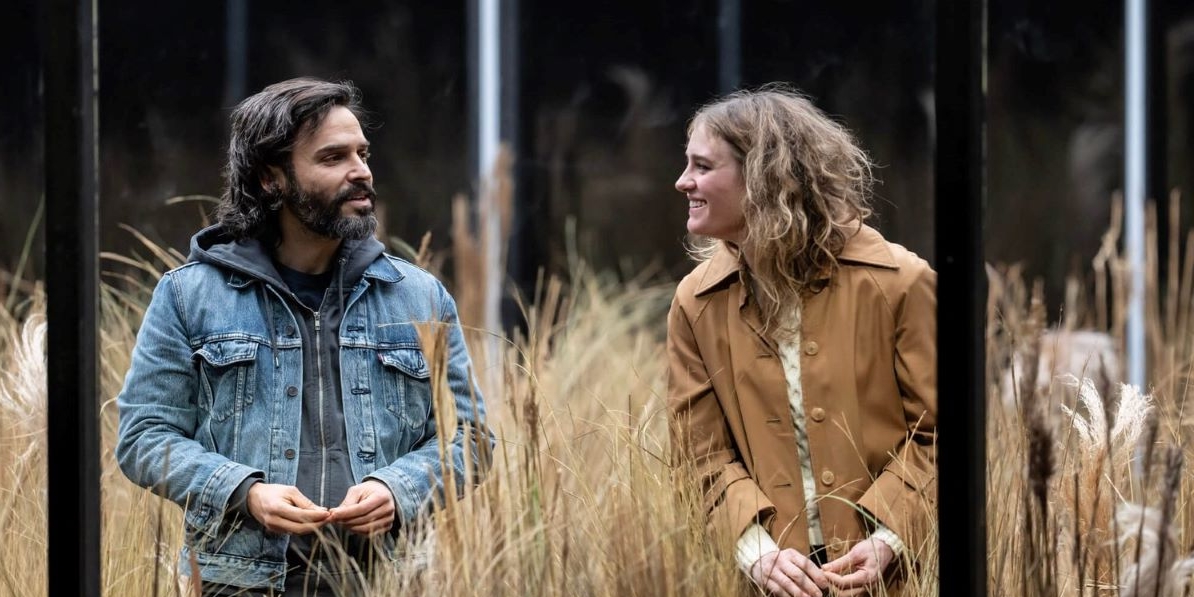Simon Stone certainly knows how to direct stunning productions! He also knows how to re-tell old stories in the most accessible ways. His production of “Phaedra” is a new play, inspired by the myth of Phaedra and the three plays by Euripides, Seneca and Racine. Interestingly, in Stone’s play there is no ‘Phaedra’. All characters have been given new names and the myth has been re-introduced via a contemporary prism.
The basis of the story remains the same: an older woman – Helen – falls fiercely in love with a younger man, Sofiane, with whom she is not supposed to sleep (in this version because this younger man is the son of her ex-lover). It is exciting to re-assess what counts as ‘forbidden’ love throughout the centuries and the impacts this can have on a family and/or a community. Phaedra’s story has always been one of a woman being called to make a choice, to prioritise her marriage and family over an affair or her sexual desire. Hearing Helen in this production talking about her experience of finding pleasure after many years in a sexless marriage, is invigorating.
The choice to replace the original royal family (Phaedra is supposedly married to a King) with a family active in politics (Helen is a politician for the Opposition) is a perfect ‘translation’. The family is very privileged, owning multiple assets, and therefore having lots of power and status. The stakes are high, and so the scandal that follows when the power that erupts from one’s rejection of one’s love is also huge.
The opening scene is striking: a minimalist open-plan kitchen and living room, surrounded by high glass windows, creates the perfect atmosphere of isolation and wealth. This beautiful living-room is literally inside a giant glass box, which has taken over the entire Lyttelton stage. Despite the fact that the glass box seems a bit of Stone’s favourite motifs (and one which we’ve seen quite a few times in the past) it works beautifully on a visual and metaphorical level. Not only that, it also solves the problem of Lyttleton’s massive – and too wide – stage! Designer Chloe Lamford has worked wonders in what the glass box can do: it rotates in a filmic way, it transforms to a posh restaurant, to a field of grass, and to a much more abstract landscape in the final act.
The more the glass box rotates and transforms (with the actors always remaining inside it) the audience feels more and more how ‘suffocated’ these characters are. The characters often comment on how ‘they can’t breath’ or they feel suffocated by their life choices. They are secluded and yet helpless. Yet, despite the literal barrier (and literal fourth wall that divides the stage from the auditorium) the action feels very immediate and direct. I wonder whether, in a strange way, the presence of the glass gives more ‘freedom’ to the audience to express themselves freely (almost as if the actors can’t really hear them?). On the night I was watching, I loved the moment when Helen’s daughter – Isolde (great UK debut by Mackenzie Davis) – was desperately trying to find out what’s happening between Sofiane and her mother. ‘Are you fucking my mother?’ she keeps asking, and when the other character doesn’t give her a clear answer, an audience member couldn’t help but shout ‘YES!’.
What is unique about this production is the blend of tragedy with farce. It was a strange experience hearing so many audience members laughing out loud to multiple lines. But the tone of the writing is at times sardonic – so cynical that one needs to laugh. I wonder if cynicism is our century’s response to extremely tragic situations. It certainly felt different – not necessarily better or worse – laughing at a family’s extreme, almost pathetic, reaction to the destructive power of desire.
Through the production’s extreme naturalism, Stone achieves a strange symbolic and heightened effect. The use of music is minimal (only during transitions and blackouts) but somehow it creates a foreboding sense of doom. The big themes of destiny and sin, which are key in the original myth, seep into this great modern re-telling.
Overall, this is a must-see production. One can only admire the skill it took to create it. The acting is superb (particularly Janet McTeer as Helen and Paul Chahidi as her husband), the writing is punchy, the conflicts constantly palpable, and the ending beautifully shocking! Stone says in the programme that “it’s a response to the world I’m living in now in the same way” and I do wonder whether perhaps this is the only way classic stories/plays should be looked at (rather than being kept locked in a ‘museum cabinet’). I leave the theatre thinking of Helen’s line about her experience of being “severed from human flesh”. What a powerful story!

